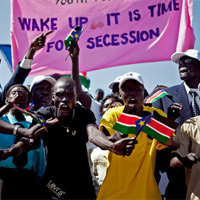
In the immediate aftermath of Sudan’s elections back in April, several potential flashpoints emerged. While the polls had passed generally peacefully in the South (at least at face value), the post-elections period has been marked by an escalation in tensions. The perception in some areas of the South that polls were rigged, combined with continued abuses by security forces and growing concerns that proxy militias are becoming more active, are making for a volatile stew in the countdown to the southern independence referendum.
- With support from the United Nations Mission in Sudan, the GoSS initially tried but failed to reconcile with Lieutenant General George Athor through negotiations. Athor, the defeated gubernatorial candidate in Jonglei and former commander of SPLA troops in the state, refused to accept anything short of removal of the incumbent (and victorious) Governor Kuol Manyang from his post, along with immunity for the renegade general and his troops. Athor’s forces clashed numerous times in May with the SPLA troops sent to contain the general, and U.N. sources quietly expressed concern for the civilians trapped inside Athor’s area of operation. There are allegations that Athor has given weapons (reportedly collected during the pre-elections civilian disarmament campaign in Jonglei, which occurred when he was still commanding the SPLA in the state) to some of his supporters.
- Following the hotly-contested gubernatorial race between incumbent strongman Governor Taban Deng (who was re-elected and is known to have strong support from the southern president Salva Kiir) and his rival Angelina Teny (the wife of the southern vice president Riek Machar Teny), Unity state has seen a number of military attacks led by former SPLA member Galwak Gai in the northwestern area of the state. The state government has been quick to link the attacks to the Khartoum government, and they accuse Khartoum of supplying Gai with weapons and supporters recruited from the pastoral Misseriya group who graze cattle in areas along the tense North-South border. Sharp discontent within communities in restive Mayom County (home of the Deputy SPLA Commander and powerful former war-time militia leader Paulino Matip) over the Governor’s choice for county commissioner could signal further problems ahead.

